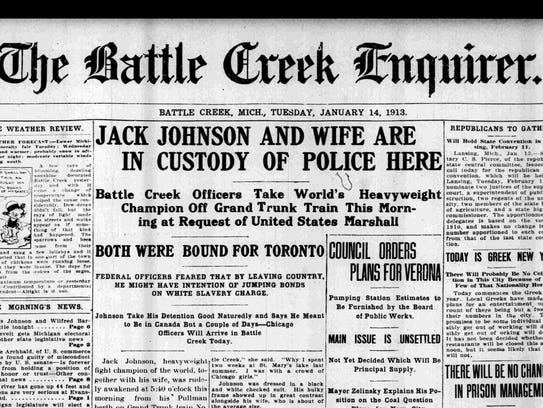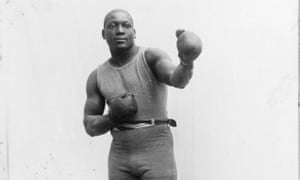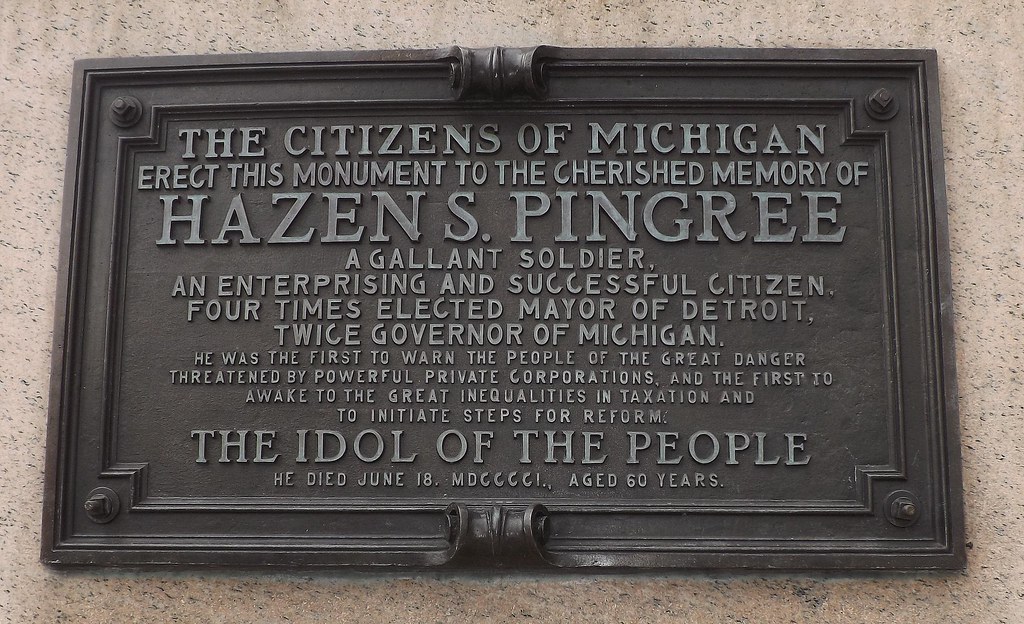
Joseph R. Williams was appointed the first president of the newly created Agricultural College. After strong lobbying by the Michigan State Agricultural Society, the Michigan Agricultural College was created on February 12, 1855. Joseph R. Williams of Constantine had been very active in supporting scientific agriculture and a strong advocate in the agricultural college movement. The first students arrived at the institution, later to become Michigan State University, in the spring of 1857. Williams served as the college’s president until he resigned in March of 1859.
Source : Michigan Historical Calendar, courtesy of the Clarke Historical Library at Central Michigan University.
For more information see Joseph R. Williams biography courtesy of Michigan State University.
Jack Johnson, the flamboyant boxer who became the first African-American heavyweight champion at the height of the Jim Crow era in 1908, was granted a rare posthumous pardon by President Donald Trump on Thursday. Trump was joined by Sylvester Stallone and world boxing champ Deontay Wilder in a White House photo op.
But the story of his arrest for violating the Mann Act — a racially motivated charge that forbid the transport of a woman across state lines for immoral purposes — runs right through Battle Creek.
Johnson had been arrested and indicted in 1912 due to his relationship with Lucille Cameron, a white woman.
The couple married on Dec. 3, 1912, then left Chicago on a one-way ticket to Toronto, which was a violation of his $35,000 bond. A Chicago Tribune reporter tipped off Chicago police, who alerted Battle Creek authorities.
On Jan. 14, 1913, the famed pugilist was found in a Toronto-bound train and arrested in Battle Creek.

Upon his arrest, Johnson told a reporter from the Battle Creek Enquirer that he was going to Canada to see his former manager about booking a fight in Paris.
“I couldn’t afford to let my mother’s house go, besides the bond that I have up,” he said. “I couldn’t afford to turn down the fight offers I have.”
According to newspaper reports from the time, Johnson was detained but not imprisoned. Instead, he was permitted to visit a former acquaintance named William Cook, an African-American barber who lived on Central Street.
An article in the Battle Creek Evening News stated, “Johnson’s appearance on the street, sleighriding, in company with his wife, stimulated many protests to the police department.”
The sleigh ride came courtesy of patrolman John Patterson, Battle Creek’s first African-American police officer. Johnson and his wife then stayed the night with Patterson until the federal authorities arrived from Chicago.
Belle Schreiber, an alleged Chicago prostitute who had an on-and-off-again relationship with Johnson between 1909 and 1910, was convinced by authorities to testify against the fighter for violation of the Mann Act.
In June 1913, Johnson was convicted and sentenced to a year and a day in prison and fined $1,000, but was not taken into custody immediately.
He and Cameron then fled separately to Canada, and the pair traveled between Mexico and Europe for the next seven years.
He returned to the United States in 1920 and was sent to the United States Penitentiary, Leavenworth, in Kansas and released in 1921.
Johnson died in an automobile crash in 1946.
Another Possible Link to Michigan:
When Johnson became rich enough to afford automobiles, he raced them down public streets, and when stopped by white policemen, whipped out some bills from his wallet and told them to “keep the change.” According to a story which has never been verified, Henry Ford gave Johnson a new car every year, assuming that when he was pulled over for speeding, a photo of a grinning Johnson beside his shiny new Ford would appear in newspapers across the country.
Sources:
Bill Ballenger, “Trump does the Right Thing: He Pardons Ex-Heavyweight Champion Jack Johnson After No Other President Would“, The Ballenger Report, May 24, 2018.
Allen Barra, “If Trump pardons Jack Johnson it won’t be for his contribution to black America“, The Guardian, May 15, 2018.
Born on this day, Dudley Randall was a famous African-American poet and poetry publisher from Detroit, Michigan. He founded a pioneering publishing company called Broadside Press in 1965, which published many leading African-American writers, among them Melvin Tolson, Sonia Sanchez, Audre Lorde, Gwendolyn Brooks, Etheridge Knight, Margaret Walker, and others. Randall’s most famous poem is “The Ballad of Birmingham”, written in response to the 1963 bombing of the Baptist church that Martin Luther King, Jr belonged to in Birmingham, Alabama, in which four girls were killed. Randall’s poetry is characterized by simplicity and realism. Other well-known poems of his include “A Poet is not a Jukebox”, “Booker T. and W.E.B.”, and “The Profile on the Pillow”.
Sources :
Dudley Randall Wikipedia Entry
On “Ballad of Birmingham”. University of Illinois at Urbana-Champaign
In 1943, the president of Local 602 presses GM to open Fisher Body hiring to blacks, and the automaker agrees. Emanuel Parker is the first black hired; he reports to work Jan. 14, 1944, according to Local 602.
For the full article, see Barbara Wieland, “After More Than a Century, Lansing Car Assembly Shuts Down Friday”, Lansing State Journal, May 1, 2005.
Macomb County was the third county created in the Michigan territory — the first being Wayne County followed by Monroe County.
In 1819 and 1820 portions of the county were removed to form the counties of Oakland, Lapeer, Genesee and St. Clair.
Macomb County was named after local hero and victor the Battle of Plattsburgh, New York, where he defeated a British army over three times the size of his own.
After the fall of Detroit, Alexander Macomb was working with raw recruits in the backwoods of New York State. The better-trained British forces were walloping the American forces. It was Macomb’s job to hold off the British long enough for his naval peers to rally on Lake Champlain.
Here’s where Detroit ingenuity comes in: Outnumbered by a British force of 11,500, Macomb took his 3,500 men, ragged and undisciplined, and in perhaps the most creative use of landscape design to that date, he planted evergreens, moved trees, and built a false road to lure the British forces away from the actual site of battle. The British got lost. The American forces triumphed. Macomb was lauded by an ecstatic nation as “the hero of Plattsburgh.”
After the war was over, grateful Detroiters erected a statue to their hometown hero and Governor Lewis Cass proclaimed that the third Michigan county to receive a name would be called Macomb.
For the rest of the story, see Mickey Lyons, “Macomb’s Irish Legacy : Exploring the story behind a familiar statue, and why the man had a Michigan county named after him”, Hour Detroit, March 3, 2015.
Amy Elliott Bragg, “Detroit history in Washington, D.C.: Alexander Macomb“, Night Train, May 9, 2012.
For more information, see “Alexander Macomb Monument”, HistoricDetroit.org
Hazen S. Pingree took office on January 15, 1890, and would embark on a career that would earn him the nickname “the Idol of the People.”
But don’t take our word on his greatness: Pingree was named the fourth-best mayor in U.S. history by a poll of scholars published in “The American Mayor” by Melvin Holli (Penn State University Press, 1999).
“His role as an advanced social reformer was unmatched by any big-city mayor in the last half of the 19th Century,” Holli wrote. He “was one of the most important pre-Progressive reform mayors and made a national reputation for himself supporting a novel work-relief program for the poor and fighting for municipal ownership and for low utility and tax rates for the urban masses.”
Sources:
Dan Austin, “The day Detroit got its greatest mayor”, Detroit Free Press, January 15, 2015.
Detroit Historical Society Facebook Page
Bill Loomis, “Hazen Pingree: Quite possibly Detroit’s finest mayor; He changed the city’s structure for the people’s benefit”, Detroit News, January 6, 2013.
Don Lochbiler, “The Shoemaker Who Looked Like a King”, Detroit News, June 11, 1998.
Hazen S. Pingree Monument entry by Dan Austin of HistoricDetroit.org
When all-male juries twice were unable to determine the guilt or innocence of a Flint man charged with being intoxicated, the judge, defense attorney and prosecutor agreed to pick Michigan’s first all-woman jury. The six women quickly agreed on a guilty verdict and the man was ordered to pay a $50 fine and spend sixty days in jail.
Source : Michigan is Amazing.
On January 15, 1936, Edsel Ford started the Ford Foundation. During its early years, the foundation operated in Michigan under the leadership of Ford family members and their associates, and supported such organizations as the Henry Ford Hospital, Greenfield Village and Henry Ford Museum, among others.
After the deaths of Edsel Ford in 1943 and Henry Ford in 1947, the presidency of the Ford Foundation fell to Edsel’s eldest son, Henry Ford II. Under Henry Ford II’s leadership, the Ford Foundation board of trustees commissioned a report to determine how the foundation should continue. The committee, headed by California attorney H. Rowan Gaither, recommended that the foundation should commit to promoting peace, freedom, and education throughout the world.
Sources :
Ford Foundation Wikipedia entry
January 15, 1936 : Ford Foundation is born, History.com

On this day in 1954, Michigan State University launched a public television station, the third in the country. One of the first two has since folded, making WKAR the second oldest continually operating public television station.
Originally, channel 60, when few tv sets went beyond 13, WKAR is now channel 23.
In January 2016, MSU pondered selling the station. The initial price the FCC put on WKAR-TV’s spot on the spectrum was $206 million, although the reverse auction format was designed to produce prices lower than the starting point. Simon had said in an interview at WKAR radio that a $200 million payment could have created an endowment that would have produced $10 million in income per year. However, on January 12, 2016 Simon announced that MSU would not participate in the auction and instead pursue a partnership with Detroit Public Television, creating new, original programming, with most aimed at children.
For more information, see Mike Hughes, “WKAR 50 Years on the Air”, Lansing State Journal, January 15, 2004.
RJ Wolcott, “WKAR decision relieves viewers”, Lansing State Journal, January 12, 2016.
On Jan. 15, 1968, Sgt. Dwight H. Johnson of Detroit earned the Congressional Medal of Honor during the Vietnam War. From the citation:
“For conspicuous gallantry and intrepidity at the risk of his life above and beyond the call of duty. Specialist 5 Johnson, a tank driver with Company B, was a member of a reaction force moving to aid other elements of his platoon, which was in heavy contact with a battalion size North Vietnamese force. Specialist Johnson’s tank, upon reaching the point of contact, threw a track and became immobilized. Realizing that he could do no more as a driver, he climbed out of the vehicle, armed only with a .45 caliber pistol. Despite intense hostile fire, Specialist Johnson killed several enemy soldiers before he had expended his ammunition. Returning to his tank through a heavy volume of antitank rocket, small arms and automatic weapons fire, he obtained a sub-machine gun with which to continue his fight against the advancing enemy. Armed with this weapon, Specialist Johnson again braved deadly enemy fire to return to the center of the ambush site where he courageously eliminated more of the determined foe. Engaged in extremely close combat when the last of his ammunition was expended, he killed an enemy soldier with the stock end of his submachine gun. Now weaponless, Specialist Johnson ignored the enemy fire around him, climbed into his platoon sergeant’s tank, extricated a wounded crewmember and carried him to an armored personnel carrier. He then returned to the same tank and assisted in firing the main gun until it jammed. In a magnificent display of courage, Specialist Johnson exited the tank and again armed only with a .45 caliber pistol, he engaged several North Vietnamese troops in close proximity to the vehicle. Fighting his way through devastating fire and remounting his own immobilized tank, he remained fully exposed to the enemy as he bravely and skillfully engaged them with the tank’s externally-mounted .50 caliber machine gun; where he remained until the situation was brought under control. Specialist Johnson’s profound concern for his fellow soldiers, at the risk of his life above and beyond the call of duty are in keeping with the highest traditions of the military service and reflect great credit upon himself and the United States Army.”
He is believed to be the first soldier from Michigan and the first African American to receive the nation’s highest military honor for service in Vietnam.
Sadly, after returning from Vietnam, Johnson had difficulty adjusting to post-war life and was diagnosed with a depression caused by Post Vietnam adjustment problems, often referred to now as PTSD. In April 1971, he was shot and killed during an altercation/robbery at a convenience store near his home in Detroit. He is buried in the Arlington National Cemetery.
Sources:
Dwight H. Johnson wikipedia entry
“Medal of Honor veteran’s life had tragic ending”, Detroit Free Press, January 14, 2012.







